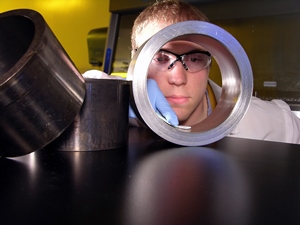Targeted drug therapies using monoclonal antibodies have been a growing topic of interest and an area of continued development. The promise of this approach has been to deliver a therapeutic (or cytotoxic) agent with greater selectivity thereby reducing toxic side effects.
One approach that has been of considerable interest and an area of continued development is antibody-drug conjugates (ADC). These rationally designed conjugates, formed through the chemical linkage of a potent small molecule cytotoxin (drug) to a monoclonal antibody (mAb), have more complex and heterogeneous structures than the corresponding antibodies. The molecular diversity of the components, cytotoxin, and biodegradable linkers, especially those for cancer, is remarkable.
This presentation addresses the challenges of analytical method development that is required for physicochemical characterization. Of paramount importance to regulatory agencies, the selection of the most appropriate analytical methods for a specific ADC must include discernment of the identity, potency and heterogeneity for the biodegradable linker, the cytotoxic drug, and the choice of mAb attachment sites (lysines, inter-chain cysteines, Fc glycans).
Recent improvements in analytical techniques such as protein mass spectrometry and capillary electrophoresis have significantly increased the quality of information that can be obtained for use in product and process characterization, routine lot release and stability testing.
Speakers

Robert J. Duff, Ph.D., manager, Biopharmaceutical Services, Lancaster Laboratories
With 15 years of industry experience, Dr. Duff serves as manager of the Biochemistry Department at Lancaster Laboratories. His team characterizes all classes of biopharmaceuticals including proteins, nucleic acids and complex carbohydrates from method development through validation. He possesses established expertise in all phases of organic synthesis and analytical method development and validation.
Previously Dr. Duff was director of Chemical Research at Cell Works, Inc, where he studied complex carbohydrate interactions with C-type lectins and galectins. Primary focus of research was the use of complex carbohydrate mimics as cell targeting ligands for therapeutic purposes.
Dr. Duff completed postdoctoral research on studies of Drug-DNA interactions at Johns Hopkins University (JHU). Subsequently, he has worked on the design and synthesis of tissue specific ligands at JHU for the 8 years under the auspices of world renown Drs. Paul Ts’o and Y.C. Lee, both of The Johns Hopkins University, Department of Biochemistry. He has numerous publications, posters and patents on subjects ranging from the study of stereoelectronic effects of enzyme active site amino acids, synthetic receptor binding and anticancer drug mechanisms.
Dr. Duff earned a bachelor’s degree in chemistry and a master’s degree in organic chemistry from The University of Pittsburgh, as well as a Ph.D. in organic chemistry from The University of Virginia.

Lieza M. Danan-Leon, Ph.D., principal scientist, Biochemistry, Lancaster Laboratories
Dr. Danan-Leon applies more than 10 years of mass spectrometry instrumentation and method development experience to her role as principal scientist in Lancaster Laboratories’ Biochemistry Group. In this position, she performs analysis of therapeutic proteins such as mAbs and ERTs, using various LC/MS-based characterization assays from method development through validation. Her expertise lies in all aspects of mass spectrometry-based analysis (qualitative and quantitative) including MS data interpretation as applied to both small molecule and large biomolecule characterization.
Dr. Danan-Leon received her Ph.D. in biological chemistry from the University of California, Davis (UCD), under the mentorship of Prof. Julie A. Leary. Her research focused on the use of quantitative LC/MS-based enzyme assay and bottom-up proteomics for investigating the kinetics and mechanisms of tyrosylprotein sulfotransferases. After which, she worked at both the Department of Molecular and Cellular Biology and the Campus Mass Spectrometry Satellite Facility providing MS support to research efforts of the UCD community.
She previously worked as a project supervisor at the National Chemistry Instrumentation Center (NCIC, Philippines), and as a college instructor of general chemistry at the Ateneo de Manila University, where she also earned a bachelor’s degree in chemistry.
Who Should Attend?
- Research Analytical Scientists
- ADC Investigators at all levels
- Contract Manufacturers and their organizations
- QC/QA and client development personnel
Xtalks Partner
Lancaster Laboratories
With a proven track record of providing quality scientific solutions for 19 of the top 20 largest pharmaceutical/biopharmaceutical companies in the world, Lancaster Laboratories is a global leader in bio/pharmaceutical laboratory services providing innovative and timely scientific solutions to streamline the drug development process.
With facilities in Lancaster, PA, Portage, MI and Dungarvan, County Waterford, Ireland, and a global capacity of over 300,000 square feet, Lancaster Laboratories has the capabilities to meet your global regulatory requirements. All of our facilities offer cGMP-compliant laboratory services and operate under the same strict quality control program and utilize the same LIMS system.
Our clients can choose from five service models, including our award-winning Professional Scientific Staffing℠ and our Full Time Equivalent model to determine the most efficient and cost-effective service solution for their project. We also provide 24-hour data access via our innovative and secure online tool at LabAccess.com℠.
For information about the recorded archive for this event contact Xtalks at (416) 977-6555 ext 371, or email [email protected]
You Must Login To Register for this Free Webinar
Already have an account? LOGIN HERE. If you don’t have an account you need to create a free account.
Create Account





